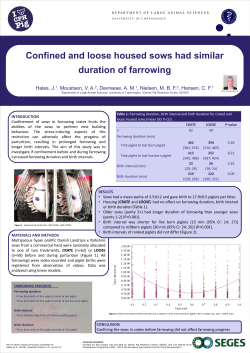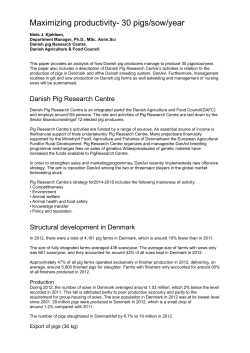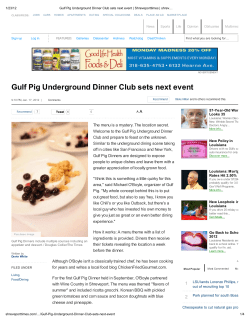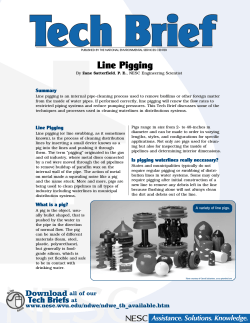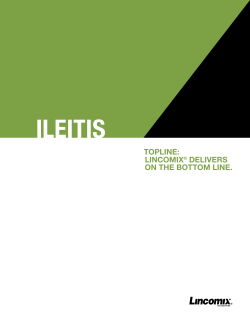
TRENDS IN PORK PRODUCTION & LIQUID FEEDING IN HUNGARY AND CENTRAL EUROPE
TRENDS IN PORK PRODUCTION & LIQUID FEEDING IN HUNGARY AND CENTRAL EUROPE Dr. Ronald Scholten 27 February 2007, Stratford, Canada TRENDS IN PORK PRODUCTION & LIQUID FEEDING IN HUNGARY AND CENTRAL EUROPE Dr. Ronald Scholten 27 February 2007, Stratford, Canada Overview I. Introduction II. Pig Farming in Hungary III. Trends in Pork Production Central-Europe I. Introduction Education Agricultural High School Agricultural University Wageningen PhD „Fermentation Liquid Feed” Work 1993: Research Institute for Pig Husbandry (NL) 1999: Head Nutrition & Quality at Beuker (NL) 2003: Hungary 2003 2004 2005 2006 45000 40000 35000 30000 25000 20000 15000 10000 5000 0 2007 Hungary Central Europe Foundated in the year 1000 „King István” 1989 free of communism 2004 member of the EU Puskás – worldfamous soccer player Szent Györgyi Albert - Vitamin C Agricultural country, rich in culture Hungary Ontario 10.000.000 12.000.000 93.000 1.000.000 Biggest city 2.000.000 2.500.000 # Pigs % Back-yard 3.850.000 30% 3.600.000 ? # Pig farms 700 3.300 Family farms <5% >95% People Km2 „Hungarian Grey”: since year 1000 „Mangalica” III. Pig Farming in Hungary „Hungary” can be readed as Central Europe 2006 compared to 1989 30 - 45% of pigs Most farms builded between 1960-1975 Dry feed 90-95% of the farms; mostly home-mixing Since 2001 subsidies to „renew” farms, BUT: Mostly inefficiency remained Farmowners didnot grew up with the farm Old knowledge Poor management / responsibility •Consequently: still bad performance HUNGARIAN PIG INDUSTRY 3,800,000 pigs (1989: 10,000,000) 700 farms housing 70% of pigs ; 30% back-yard Biggest location has 2.000 sows and fatteners Biggest company has 15.000 sows, integration Most farms are closed farms The farmsize is big compared to West Europe, BUT..... CANADA: Maple Leaf Hytek USA: Smithfields 116.000 sows 54.000 sows 1.200.000 sows OUR GROUP in HUNGARY: Own Farms Momently 45.000 fatteners/yr; goal 100.000 pc Momently 45.000 piglets / yr; goal 100.000 pc 2008 start-up new sow farm (6.000 sows) Sales of equipments 2 projects of 6.000 fatteners each Project of 10.000 fatteners Consultancy (feed + management) Foreign Pig farms in Hungary Our farms Dutch owners Danish owners CEGLÉDBERCEL farm KÖRNYE farm Buying of Piglets Import: Holland (1200 km) and Germany (900 km) Only SPF piglets: free of Mycoplasma, PRRS, APP Weaned piglets PIC sow and Danish-Duroc boar Why SPF weaned piglets? Better Health Status Cheaper Transport Benefits in finisher period (own farms !) Arrival of Piglets Every Thursday Breeder separeted female-castrates Spray sunflower oil on piglets Direct „Cola” in trough. After that feeding. Temperature minimum 27-28 °C First 24 hours continiously light Preventive feed-medicination against Coli and Streptococcus (5 days) Sales of Fatteners In average 114-115 kg liveweight Always full truck (200 pc) 2006: average 300 HUF/kg live (=1,81 CAD) Febr 2007: 260 HUF/kg live (=1,56 CAD) Pig 115 kg (110 kg paid) 33.000 HUF / 200 CAD + V.A.T. No costs 1 CAD = 165 HUF Slaughterhouses Small scale, financial weak position Biggest slaughterhouse H: 1.000.000 pigs / year Danish Crown (DK): 20-21.000.000 pigs / year VION (NL): 18-19.000.000 pigs / year Both 9-10% of EU ECONOMICS – fatteners October 2006 CAD $ CANO KFT ONTARIO Piglet 25 kg 88 56 Feed 48 48 Labour 3.5 4.2 Health 8.0 1 2.8 G/W/E 2 ? Others 5.5 2 5 TOTAL var. costs 155 116 1: Incl. vet, med., destructor, costs mortality (piglet + feed) 2: Incl. bookk., insurances, manure, telephone ECONOMICS – fatteners October 2006 CAD $ CANO KFT ONTARIO Sales 115 kg (110 kg) 200 140 Total var.costs 155 116 Bruto Profit / pig 45 24 COSTPRICE – COSTPRICE – COSTPRICE.. 2006 2007 ADG (g/d) 750 840 FCR (kg/kg) 2,75 2,50 Mortality (%) 5 1,5 CANO Kft Our farms changed to SPF animals: Reduction health costs: 6 CAD €4 Better FCR: 5 CAD € 3,2 14 CAD € 9,1 Extra sold kg (8-9 kg) Higher buying-price SPF-piglet 9 CAD €6 Performance „Stimulation” Green - Red 4. Central & East Europe Producers a. Key data of Pig Industry b. Impact on Global Trade Markets c. Impact on traditional producers West Europe d. Animal welfare – Food Safety – Environment e. Conclusions a. Key Data x1 M pc 1996 2000 2006 2010 ZVG POL 18 17 19 + Export HUN 5,3 4,8 3,9 ++ 95% ROM 8 5,8 5,0 + 69% UKR 13 7,6 8,0 ++ 50-60% RUS 22,6 15,7 15,5 ++ 50-60% POL increasing pig numbers, extremely lot small farmers !! HUN increase pig numbers with 2.500.000 pc UKR 2006 build 200 new farms; +2.000.000 pigs (2007) RUS building 50 megafarms; goal is 18 M pigs Trends Central Europe - new EU members - From 1989 sharp reductions pig populations (50-70%) From 2004 (EU) another 15-20% reduction Back-yard farming (slowly) disappears Economic situation (income) improves meat cons. Pig population will increase next 5 years, esp. fattening Holland exports annually >800.000 piglets to HUN, POL, SLO, ROM, CRO Developments Central Europe - new EU members - A. Farmers from DK, NL B. Industrial Integration: Smithfield (backwards integration) • POL: 60.000 sows, meat, feed. Goal 2011: 120.000 sows • ROM: 32.000 sows, meat, feed. Goal 2011: 200.000 sows „Smithfield starts at the end” (buy sales-channel) They just bought Sare Lee in West-Europe, 1 billion $ Developments Central Europe - Ukrain / Russia - Ukrain: 2006: +11% pigs, building projects for 200 new farms 2007: +2.000.000 pigs Investorgroups (f.e. Danish) + oil companies Russia: Government would like to reduce huge import of pig meat Special investment programmes Farms of 10.000 sows and 70.000 fatteners Biggest problem: MANAGEMENT and KNOW-HOW ! In general performance is dramatic: Inefficiency No responsibility No scills b. Impact on EU Market Sofar, biggest benefits for West European pig producers German slaughterhouses / meat industry spectacular growth On mid-term POL and HUN will become concurrents of traditional pig producers NL/DK. „Only” on fattening. In 2007 ROM and BUL will NOT influence internal EU markets. (swine-fever vaccinations) ROM imports yearly 220.000 tonnes pigmeat BUL imports yearly 45.000 tonnes pigmeat c. Impact on Global Markets ROM and BUL will buy less meat from outside EU (f.e. USA / Canada annual 50.000 tonnes) import EU Midterm, the 10+2 new EU members will not be concurrents on the global market for Brazil / Canada / USA. HUN exports to Asian (Korea/Japan) and also USA The demands for more meat in the new EU countries (and in future also Ukraina and Russia) increase more quick than the production. More EU-meat will stay in EU. d. Animal Welfare, Food Safety EU basic rules concerning Animal Welfare, Food Safety, Environment, ..... Members have to full-fill basic rules. Country can make additional rules on the basic EU rules Some basic EU rules: • Number of pigs per m2 (fattener till 110 kg 0,65 m2) • Light (lux) • Maximum 170 kg N / ha • Liquid manure storage minimum 4 months • Maximum Cu and Zn levels in feed • Forbidden „preventive use” of antibiotics in feed Smithfield announced to make group-housing sows till 2016.... Conclusions o At this moment pig farms in Central Europe cannot compete with Brazil/Canada/USA or Netherlands/Denmark. o Europe: production slaughterpigs will relocate from WE towards CE. „The pigs will go there where is the grain” o USA, Canada and Brazil will (once) reach the maximum levels of production-growth because of „external factors” (environment, animal wellfare, animal health, politics). o Bio-fuels SURELY „influences” pig production world-wide o Economic growth of Russia and China ..... Thanks a Lot ronald@inext.hu www.cano.hu +36 709403028 mobile YOU’RE WELCOME ON OUR FARMS
© Copyright 2025















